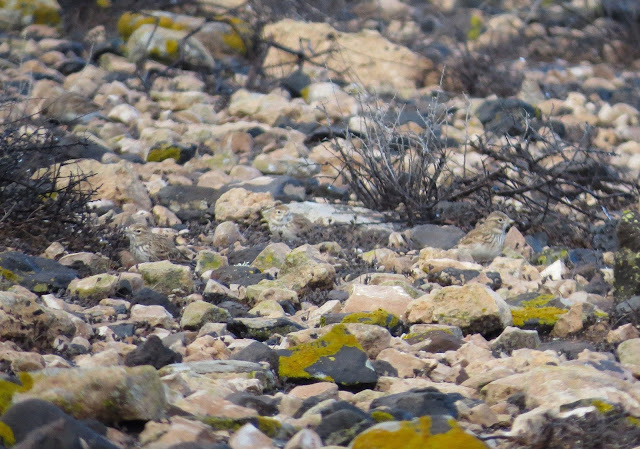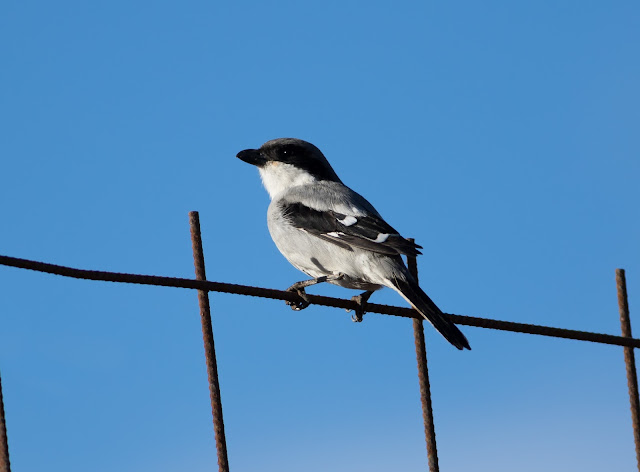Day 3:
Moved in to a new (hopefully
flood proof) apartment at the other side of the complex, having already seen
most of our expected main Fuerteventura targets for the trip we decided to
spend another day seawatching on the outside chance of connecting with a
Red-billed Tropicbird off the coast. Setting up base on the eastern side of the
island at Caleta de Fuste, we positioned ourselves near Caleta Corcha Bay and
around the Hotel Elba area where a number of Red-billed Tropicbird sightings had
occurred in recent years.
Sadly on this occasion our
efforts didn’t bear fruit on the Tropicbird front, but we were treated to a
steady and continuous stream of Cory’s Shearwaters passing off the coast along
with around 30 Bulwer’s Petrels, their thin black wings powering across the
waves and all heading south. A new species for me, the distance of the birds
had me unsure as to whether they could be Sooty Shearwaters, but a helpful
email from the Fuerteventura e-bird co-ordinator once home confirmed Alex’s initial
suspicions that they were in fact the smaller Bulwer’s Petrels – Sooty
Shearwaters being extremely uncommon in Fuerteventura waters in October. An
excellent bird, and one I hadn’t fully expected to see on our trip. Scanning
the rough seas for any white and red shapes, we spotted a large number of
Gannets offshore, both adults and juveniles, while two adult Pomarine Skuas
complete with spoons were a nice and unexpected find.
With our seawatching not
yielding anything more of note bar a handful of close in Sandwich Terns, we
instead ventured over to the Barranco de la Torre, another good site for
Fuerteventura Chat and Trumpeter Finch.
With the dark thunderous rainclouds
threatening ominously over the mountains as we approached the site, we had
barely taken a few steps out of the car when the heavens opened and large
splashes of water showered our optics.
With cracks of thunder and lightning
putting on a dramatic show directly overhead, we legged it back to the car, a
lone but close Berthelot’s Pipit the only reward for our efforts.
 |
| Berthelot's Pipit |
After the weather had calmed
slightly, we gingerly ventured outside once more, exploring the reedy fringes
of a small pool at the end of the track. Here several more Spectacled Warblers
moved stealthily around the scrubby edges, while a small flock of Spanish
Sparrows chirruped noisily from the twiggy branches.
 |
| Spanish Sparrow |
Scanning the water, four
Black-winged Stilts - our first birds of the trip - took flight, circling in
the sky before alighting back down to feed in the reedy edges. Several
Moorhens, again our first for the trip, bobbed up and down on the pool’s
surface while another pair of Ruddy Shelducks sat peacefully on the bank.
With
the rain threatening to come in once again, we decided to call it a day at the
Barranco, four Egyptian Vultures circling high up between the two mountain
valleys our most notable birds at the site, making an appearance as we left.
 |
| Egyptian Vulture |
 |
| The goats at Barranco de la Torre! |
With the afternoon to spare
and with Reserva de El Jarde having delivered so spectacularly on our first
day, we decided to end the day there in an attempt to try and get some better
photographs of either the bustards or the Trumpeter Finches.
Sadly, neither
species put in an appearance on our second visit, although we did encounter
presumably the same pair of Ruddy Shelducks from two days ago, this time
sitting slightly closer to the track and allowing us much better views as they
navigated the rubble strewn terrain.
 |
| Ruddy Shelduck |
The usual Berthelot’s Pipits once again
perched in the cacti decorating the sparse gardens, while the Canary Island
races of Buzzard and Raven soared overhead.
 |
| The Traditional Cheese Trail! |
Deciding to explore a bit more
of the twisted tangle of tracks incorporating the “Traditional Cheese Trail” on
the site, we encountered four more Egyptian Vultures, this time perched on the
telegraph poles and quite possibly being the same four birds from an hour
earlier at Barranco de la Torre.
 |
| Egyptian Vulture |
A Southern Grey Shrike of the
Canary Islands subspecies koenigi put on a great show at the side of the road,
providing our closest views to date, while once more the flock of Spanish
Sparrows fed greedily on the spilt seed at the goat farm.
 |
| Southern Grey Shrike |
Taking a closer look
amongst the goats revealed no fewer than 10 Hoopoes foraging in the mud and we
spent an enjoyable ten minutes or so watching this classic and iconic species
as they fluttered around the farm.
 |
| Hoopoe! |
 |
| Lesser Short-toed Larks |
 |
| The larks were very well hidden! |
Once more the air was filled with the sound of hundreds of Lesser Short-toed Larks as they fed in one huge superflock amongst the tiny plants and stones on the plains, interspersed by the distinctive pig-like calls as a flock of Black-bellied Sandgrouse wheeled overhead. Remaining distant during our trip to Fuerteventura, luckily we had
enjoyed excellent views of this species on mainland Spain several years
earlier, only managing to get distant record shots in flight on this occasion.
 |
| Black-bellied Sandgrouse - honest! |
With time pressing on and with
no sign of the Trumpeter Finches around the goat farm, we headed back to our
(thankfully dry) hotel room for the night to relax, enjoying a tasty Italian
meal from a nearby restaurant and stocking up on the mandatory fridge magnets
and keyring souvenirs to bring home as mementos of our trip.































No comments:
Post a Comment